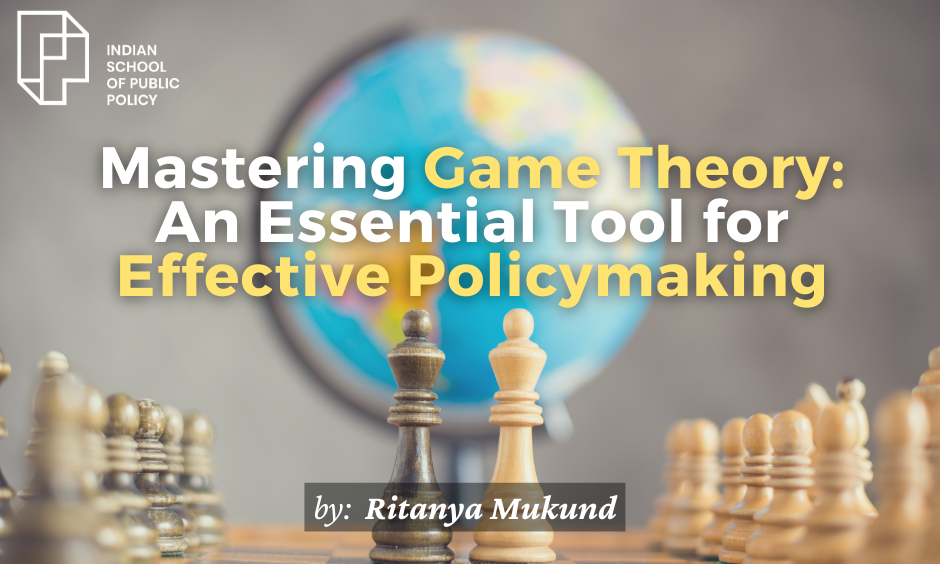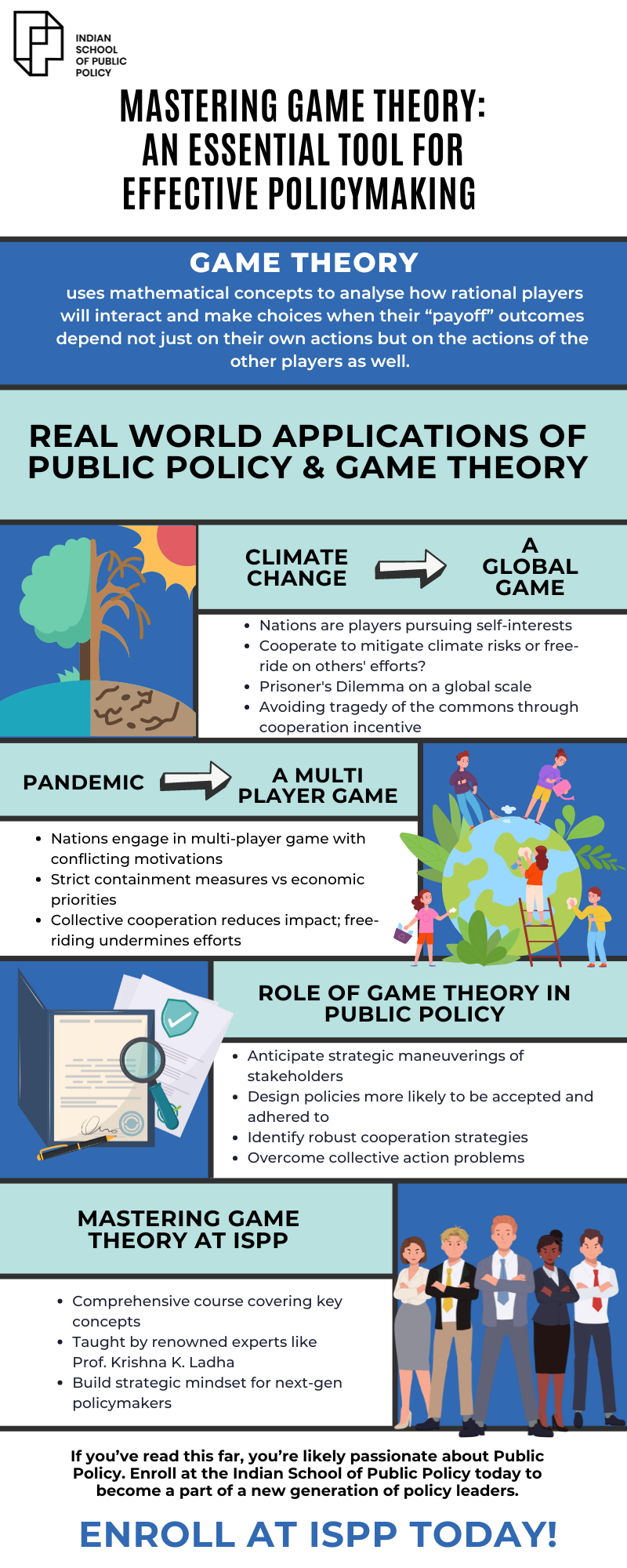
Mastering Game Theory: An Essential Tool for Effective Policymaking

Imagine you and your friend are both hungry and want to go out for brunch. There are two restaurants in your town- one that serves pizza and another with burgers. You really enjoy pizza, but your friend prefers burgers. Now, if you both went to different restaurants based only on your preference, you’d miss out on the fun of having lunch together. Therefore, you try to figure out what the other person wants and then pick the restaurant accordingly. This situation wherein you have to think about the other person’s desires along with your own to make the best decision is essentially a “game.” Game theory uses mathematical concepts to analyse how rational players will interact and make choices when their “payoff” outcomes depend not just on their own actions but on the actions of the other players as well; this highlights the interdependency of players. It helps predict how rational, self-serving parties will act when they have to consider and potentially outwit the actions and motives of the opponent with conflicting interests. Do you compromise? or do you stubbornly stick to your own choices? Sound familiar? This is essentially the arena in which policymakers operate daily.
Think about it- The grave threats of climate change become increasingly undeniable and the world faces a conundrum – why do we lack a robust system to mitigate the risks of climate change? Applying the lens of game theory reveals that this is a multi-player game of complex strategies. The players in the game are the nation-states of the world, each pursuing their own self-interests and must decide whether to pursue policies reducing emissions or not. The socially optimal outcome is universal cooperation leading to mitigated climate risks. However, a country can “free-ride” by defecting while others cooperate, enjoying cheaper energy without bearing mitigation costs. If all defect, we face catastrophic climate damages – the classic Prisoner’s Dilemma on a global scale. Game theory suggests a Nash Equilibrium as the only stable choice since no country wishes to bear mitigation costs unilaterally. But this risks an existential crisis that no rational player would desire. This is the climate conundrum when seen as an analytical game.
Through the game theory mechanism, climate change can be viewed as a repeated game where players share a common pool of resources that everyone can access. If appropriately managed, this resource can be the source of sustenance. But take too much, too quickly, and the resource disintegrates. This instability is referred to as the “tragedy of the commons.” This can be avoided through the intelligent use of game theory, whose value lies in using its concepts to explore mechanisms that could reshape incentives, reward cooperation, and limit the temptations of individual players to “free ride” and consequentially help resolve the dilemma. Similarly, game theory can provide insights into addressing global health challenges like pandemics, where nations and organisations are players in a game and where their actions impact the spread and containment of infectious diseases. The COVID-19 pandemic, for example, can be viewed as a multi-player game where each nation’s strategy revolves around measures like lockdowns, travel restrictions, vaccination drives, and economic policies to combat the virus’s spread and its impact. The Prisoner’s Dilemma is a relevant game theory concept here because if all nations cooperate by implementing strict containment measures, the collective payoff is minimising the pandemic’s global impact. However, each nation is tempted to free-ride by prioritising its economic interests over containment, benefiting from others’ cooperation while avoiding costly measures. This highlights how unilateral decisions can undermine collective efforts, prolonging the pandemic. Thus, Game theory illuminates stakeholders’ dilemmas, constraints, preferences, and beliefs based on their actions/strategies. Also, it exposes the delicate balance between individual and collective interests. It could identify robust strategies that align individual and collective interests, mitigating “free-riding” behaviour. Game theory can deduce the possible outcomes that could result from the implemented strategy, and if the intended policy outcome is not achieved, it will help reveal why.
Through its analytical lens, game theory equips policymakers with the ability to anticipate and navigate the strategic manoeuvrings of various players, enabling them to design policies that are more likely to be accepted and adhered to. Moreover, it identifies stable outcomes, providing insights into fostering cooperation and overcoming collective action problems. Game theory is an indispensable tool for policymakers in an interconnected world with global challenges. This is why the Indian School of Public Policy offers a comprehensive course on Game Theory and its application to the policy realm. Taught by Krishna K Ladha, professor at ISPP and Distinguished Fellow at India Development Foundation, the course covers key concepts like backward induction, Nash equilibrium, repeated games, and other concepts through the pioneering work of Nobel Laureates. Students gain a nuanced understanding of the interconnectedness between public policy and game theory. Mastering game theory equips the next generation of policymakers with the mindset and skills necessary to be strategic players in the game of public policy.
Enroll at ISPP today to gain an edge over everyone else by incorporating the application of game theory into the world of public policy.
Register your Interest to Study at ISPP
Infographic:


Ritanya Mukund
Ritanya Mukund, is an undergraduate pursuing a dual degree in Data Science and Computer Science from Krea University. She is currently interning at the Indian School of Public Policy, where she applies her analytical abilities to address real-world public policy challenges. Her liberal arts education has cultivated a holistic mindset, enabling her to integrate diverse perspectives into her work. Her unique blend of technical expertise and multidisciplinary approach positions her well for a career in driving data-driven policy solutions.

